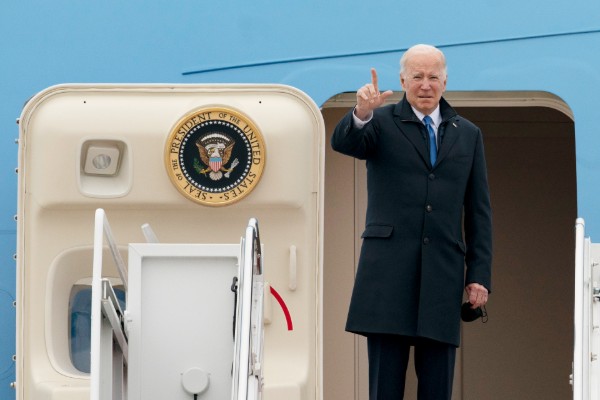White House website says President Joe Biden will visit Israel “later this year.”
By Pesach Benson, United With Israel
Readouts of presidential phone calls with foreign leaders don’t usually rank high on anyone’s list of exciting reading.
But the White House website’s anodyne summary of President Joe Biden’s phone call with Prime Minister Naftali Bennett sparked some buzz over the news that the Commander in Chief will be visiting Israel this year.
Referring to their Sunday conversation, the website mentioned in passing, “The President thanked the Prime Minister for his invitation to visit Israel and said he looks forward to a visit later this year.”
No potential dates or time frames were mentioned. The summary was dominated by the usual buzzwords of the Israeli-U.S. “historic partnership” and commitments to “security, freedom and prosperity in the Mideast.”
Spoiler alert: The rest of the readout referred to expanding regional partnerships in the spirit of the Abraham accords, the Iranian threat, the death of Islamic State leader Abu Ibrahim al-Hashimi al-Qurayshi, White House’s support for replenishing the IDF’s stock of Iron Dome interceptors, and rising Russia-Ukraine tensions.
Summit Setbacks
Biden’s last official visit to Israel was a difficult one.
In March 2016, he was visiting the Peres Center for Peace in Jaffa when a Palestinian terrorist went on a stabbing spree nearby. Taylor Force, a U.S. student, was killed and seven other people were injured that night.
Biden was especially frustrated with the PA’s refusal to condemn the attack. Congress later passed the Taylor Force Act, cutting funding to the Palestinian Authority over its stipends to terrorists and their families.
Also during the visit, Israel’s Interior Ministry announced plans for 1,600 housing units in the eastern Jerusalem neighborhood of Ramat Shlomo, which strained Biden’s talks with then-Prime Minister Benjamin Netanyahu.
Much has changed since 2016. Israel is now governed by a broad — though fragile — coalition headed by Prime Minister Naftali Bennett. The Jewish state is less isolated diplomatically, thanks to its relationships with the United Arab Emirates, Bahrain and Morocco.
The U.S. embassy is now located in Jerusalem, though the Biden administration continues fighting an uphill battle to reopen a consulate for the Palestinians.
Unlike former President Barack Obama, Biden’s approval ratings have plummeted over his handling of COVID, inflation, Ukraine and Afghanistan.
The latter is a particular black eye for the White House: The Biden-Bennett summit of August was delayed after a suicide bomber killed 182 people — including 13 U.S. servicemen — at the Kabul airport.
Biden has had a string of bad luck in summits with Israeli leaders. Will that change in 2022?
Do You Love Israel? Make a Donation - Show Your Support!
Donate to vital charities that help protect Israeli citizens and inspire millions around the world to support Israel too!
Now more than ever, Israel needs your help to fight and win the war -- including on the battlefield of public opinion.
Antisemitism, anti-Israel bias and boycotts are out of control. Israel's enemies are inciting terror and violence against innocent Israelis and Jews around the world. Help us fight back!
